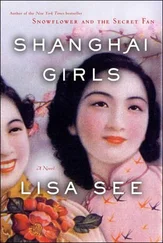Lisa See - Peony in Love
Здесь есть возможность читать онлайн «Lisa See - Peony in Love» весь текст электронной книги совершенно бесплатно (целиком полную версию без сокращений). В некоторых случаях можно слушать аудио, скачать через торрент в формате fb2 и присутствует краткое содержание. Жанр: Старинная литература, на английском языке. Описание произведения, (предисловие) а так же отзывы посетителей доступны на портале библиотеки ЛибКат.
- Название:Peony in Love
- Автор:
- Жанр:
- Год:неизвестен
- ISBN:нет данных
- Рейтинг книги:4 / 5. Голосов: 1
-
Избранное:Добавить в избранное
- Отзывы:
-
Ваша оценка:
- 80
- 1
- 2
- 3
- 4
- 5
Peony in Love: краткое содержание, описание и аннотация
Предлагаем к чтению аннотацию, описание, краткое содержание или предисловие (зависит от того, что написал сам автор книги «Peony in Love»). Если вы не нашли необходимую информацию о книге — напишите в комментариях, мы постараемся отыскать её.
Peony in Love — читать онлайн бесплатно полную книгу (весь текст) целиком
Ниже представлен текст книги, разбитый по страницам. Система сохранения места последней прочитанной страницы, позволяет с удобством читать онлайн бесплатно книгу «Peony in Love», без необходимости каждый раз заново искать на чём Вы остановились. Поставьте закладку, и сможете в любой момент перейти на страницу, на которой закончили чтение.
Интервал:
Закладка:
I dutifully obeyed, but each stroke of my brush was a caress I gave my poet. Each swish of my brush was my fingers on his skin. Each character completed was a gift to the man who had so invaded my thoughts.
Every moment of the day and night that one of my aunts wasn’t in my room I still had Shao. Like Willow, she slept on the floor at the foot of my bed. She was there when I woke up, there when I used the chamber pot, there when I did my lessons, there when I went to sleep. I was there for her too, listening to her snoring and farting, smelling her breath and what left her body and went into the chamber pot, watching her scratch her rump or clean her feet. No matter what she did, she was unrelenting in what spewed from her mouth.
“A woman—and your mother has recognized this in you—becomes unruly through knowledge,” she told me, contradicting my aunts’ teach-ings. “In your mind you go too far beyond the inner chambers. It’s dangerous out there; your mother needs you to understand that. Forget what you’ve learned. Instructions from Mother Wen tells us that a girl should know only a few written characters, like firewood, rice, fish, and meat. These words will help you run a household. Anything more is perilous.”
Just as door after door was closing me in, my heart was opening wider and wider. A dream visit to the Peony Pavilion had given Liniang a case of lovesickness. Visits to pavilions in the Chen Family Villa had given me my lovesickness. I had no control over my activities—how I dressed or my future life with this Wu Ren—but my emotions remained untrammeled and free. I’ve come to believe that part of lovesickness comes from this conflict between control and desire. In love we have no control. Our hearts and minds are tormented, teased, enticed, and delighted by the overwhelming strength of emotions that make us try to forget the real world. But that world does exist, so as women we have to think about how to make our ( 7 2 )
husbands happy by being good wives, bearing sons, running our households well, and being pretty so they don’t become distracted from their daily activities or loiter with concubines. We are not born with these abilities. They must be instilled in us by other women. Through lessons, aphorisms, and acquired skills we are molded . . . and controlled.
My mother controlled me through her instructions even as she refused to see me. My aunts controlled me through their lessons. My future mother-in-law would control me after marriage. Together, these women—from the time I was born until the day I died—would control every single minute of my life.
Yet for every effort at control, I was spinning away. At every moment, my poet invaded my thoughts—during every stitch, every strum, every didactic lesson. He was in my hair, my eyes, my fingers, my heart. I day-dreamed about what he was doing, thinking, seeing, smelling, feeling. I could not eat for thoughts of him. Each time petal-scented air came through my window, my emotions were thrown into turmoil. Did he long for a traditional wife or a new wife, like the one he talked about the night we met in the Moon-Viewing Pavilion? Would his future wife give him what he wanted? And what about me? What would happen to me now?
At night, as moonlight sent scattered shadows of bamboo leaves across my silk bedding, I dwelled in these dark thoughts. Sometimes I would get up, step over Shao, and go to the drawer where I kept the sprig of willow my poet had given me on our last night together. As the weeks went by, leaf after leaf fell away and crumbled to nothing, until all that was left was the twig. My little speck of a heart was soaked through with sadness.
Over time I improved on the zither, memorized rules, and worked on my embroidery. Two months into my seclusion, Third Aunt announced,
“You are ready to make shoes for your mother-in-law.”
Every bride does this as a sign of respect, but for years I’d dreaded this task, knowing my needlework would instantly reveal my flaws. Now I dreaded it even more. While I would no longer embarrass myself or bring shame on my family through my stitches, I had no feelings for this woman and felt no need to impress her. I tried to imagine she was my poet’s mother. What else could I do to protect myself from the hopelessness I felt? My mother-in-law’s name was the same as mine—Peony—so I in-corporated that flower, the hardest of all to paint or stitch, into my design.
I spent hours on each petal and leaf until after a month the shoes were completed. I held the pair in my hand and showed them to Third Aunt.
( 7 3 )
“They are perfect,” she said, and she meant it. I may not have woven in strands of my hair or made them as airy as she would have, but by any other standard they were splendid. “You may wrap them.”
on th e n i nth day of the ninth month, when we commemorate Lady Purple, who was treated so badly by her mother-in-law that she hanged herself in the privy she was required to clean each day, the door to my room opened and my mother entered. I bowed deeply to show my respect, and then I stood still, my hands clasped before me, my eyes cast down.
“ Waaa! You look . . . !” The surprise in Mama’s voice caused me to glance up. She must have still been angry with me, because her face was disturbed. But she had perfected the art of hiding her feelings, and her features quickly settled. “Your final bride-price gifts have arrived. You might like to see them before they’re put away. But I expect you to—”
“Don’t worry, Mama. I’ve changed.”
“I see that,” she said, but again I did not detect pleasure in her tone.
Rather, I heard concern. “Come. Take a look. Then I want you to join us for breakfast.”
As I left my room, a single thread held together my emotions—loneli-ness, despair, and my unwavering love for my poet. I had learned to vent my sorrows through sighs.
I followed my mother at a respectful distance to the Sitting-Down Hall. My bride-price gifts had been brought to our home in lacquer-framed boxes that looked like glass coffins. My family had received the usual items: silks and satins, gold and jewelry, porcelains and ceramics, cakes and dumplings, jars of wine and roast pork. Some of these things were for me; most were for my father’s coffers. Ample gifts of cash were for my uncles. This was physical proof that my marriage was going to happen—and soon. I pinched the bridge of my nose to keep from crying.
Once my emotions were under control, I planted a placid smile on my face. I was out of my room at last and my mother would be watching for any lapse in the proprieties. I had to be wary.
My eyes fell on a package wrapped in red silk. I glanced at my mother, and she nodded to let me know I could open it. I peeled back the soft folds. Inside was a two-volume set of The Peony Pavilion. It was the only edition I didn’t already own, the one from Tang Xianzu’s private press. I opened the note that came with the set. Dear Same, I look forward to staying ( 7 4 )
up late with you, drinking tea, and talking about the opera. It was signed by my future husband’s sister-in-law, who already lived in the Wu household.
The bride-price payments were fine, but this gift told me that there was at least one person in the Wu family’s women’s chambers with whom I might find companionship.
“May I keep this?” I asked my mother.
Her brow furrowed and I thought she would say no.
“Take it to your room and then come straight away to the Spring Pavilion. You need to eat.”
I clutched the volumes to my chest, walked slowly back to my room, and set them on my bed. Then, following my mother’s orders, I went to the Spring Pavilion.
I’d been locked away for two months, and I looked at the room and everyone in it with new eyes. The usual tensions bubbled among my aunts, my cousins, my mother, and those women and girls who were unseen in the morning—the concubines and their daughters. But because I’d been away I saw and felt an undercurrent that I’d never fully noticed before. Every woman is expected to be pregnant at least ten times during her lifetime. The women in the Chen Family Villa had trouble getting pregnant, and when they did they seemed incapable of dropping a son.
Читать дальшеИнтервал:
Закладка:
Похожие книги на «Peony in Love»
Представляем Вашему вниманию похожие книги на «Peony in Love» списком для выбора. Мы отобрали схожую по названию и смыслу литературу в надежде предоставить читателям больше вариантов отыскать новые, интересные, ещё непрочитанные произведения.
Обсуждение, отзывы о книге «Peony in Love» и просто собственные мнения читателей. Оставьте ваши комментарии, напишите, что Вы думаете о произведении, его смысле или главных героях. Укажите что конкретно понравилось, а что нет, и почему Вы так считаете.












